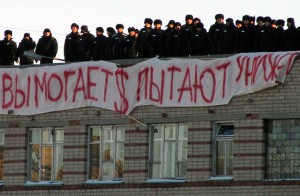
The string of anticorruption exposures reached Russia’s most conservative state institution — the prison system. On March 31, Alexander Reimer, head of the Federal Penitentiary Service (FSIN) from 2009 to 2012, was placed under arrest. It had never happened before in post-Soviet Russia that the highest ranking law enforcement official, though former, got to jail.
Many people believe that, being a state within a state, Russian penitentiary system represents the legacy of the notorious Gulag. Even prison doctors are subordinate to the warden of the prison where they work, instead of the Russian Ministry of Health like all other doctors in the country (with neither the former not the latter remembering about the Hippocratic Oath). Human rights activists claim that provisions of the labor legislation with regard to inmates are being violated and prison statistics are being rigged.
Since the time of the Gulag, the key function of Russian prisons and penal colonies has always been repressive and punitive. There is no better way of “convincing” or “breaking” any person, especially a businessman who has something to lose, than by depriving him or her of freedom. Whatever the reason that brought a person to jail, prison makes him or her vulnerable. There are a million ways to create problems in institutions of confinement. The prosecutorial supervision mechanism provided by the law hardly works, since the principle of “mutual guarantees” – when officials prefer covering each other’s backs instead of helping victims – is very common in Russia. There are many reports of jail beatings happening in different regions: Vladivostok, Novosibirsk, the Republic of Kalmykia. Prisoners and their families mostly place their hopes not in the state authorities, but in civil society organizations, such as public supervisory commissions and different nongovernmental organizations that monitor the most egregious human rights violations in Russian prisons. It is obvious that non-government organizations have very limited opportunities to influence the situation in institutions of confinement, not to mention prevent daily violations that take place there.
In today’s Russia, FSIN serves as a bludgeon used against uncooperative citizens. Frame-up criminal cases, especially against entrepreneurs, start with psychological brainwashing when the investigator explains to the person under investigation what will happen if he or she does not fulfill the given conditions (such as sign documents, give away shares in a company, transfer money, etc.) In this sense, media reports about brutality against prison inmates play into the hands of the authorities and, in most cases, people give up without a fight. Those who try to fight for their rights find themselves on the next level, where they suffer physical violence, usually at the hands of their cellmates. However, FSIN officials themselves are also known to beat up prisoners. The most notorious cases of physical violence that can only be called torture and that provoked a wide public response both in Russia and abroad include the cases of Sergei Magnitsky, Vitaly Buntov , Sergei Lasko, and violations at the Kopeisk Penal Colony.

According to some experts, one in three inmates is currently incarcerated in connection with an economic activity. The notion of “frame-up criminal case” has gained widespread usage not only by businessmen, but also by lawyers, journalists, and even law enforcement officials themselves. We have already addressed the problem of convictions based on illegal criminal prosecution of entrepreneurs in Russia. However, with the arrest of the country’s former chief prison warden this topic takes a new turn. The criminal case initiated against Alexander Reimer not only shows that an old Russian saying that goes “don’t count out a prison cell, a begging bowl may come as well” remains as relevant as always. Moreover, law enforcement officials seem to be determined to make an example by lynching a “traitor.” According to the charges against Reimer, he illegally profited from FSIN’s purchase of electronic monitoring bracelets introduced on his initiative to monitor compliance with house arrest rules of the accused who are not yet put in prison, but whose freedom of movement is considerably limited since they are confined to their residences. Apparently, unlike in the case of former Defense Minister Anatoly Serdyukov, the authorities decided not to cut Reimer any slack and sent him directly behind bars either as punishment for being obviously corrupt or for softening the attitude toward entrepreneurs. Thus, he has been presented with an opportunity to evaluate first hand the quality of his work on improving conditions in Russian prisons, and at the same time experience the beauty of a “frame-up case.” The wonder is whether in Reimer’s case his former colleagues will use well-known methods of “convincing”, or will take pity on him since he is after all one of them.





